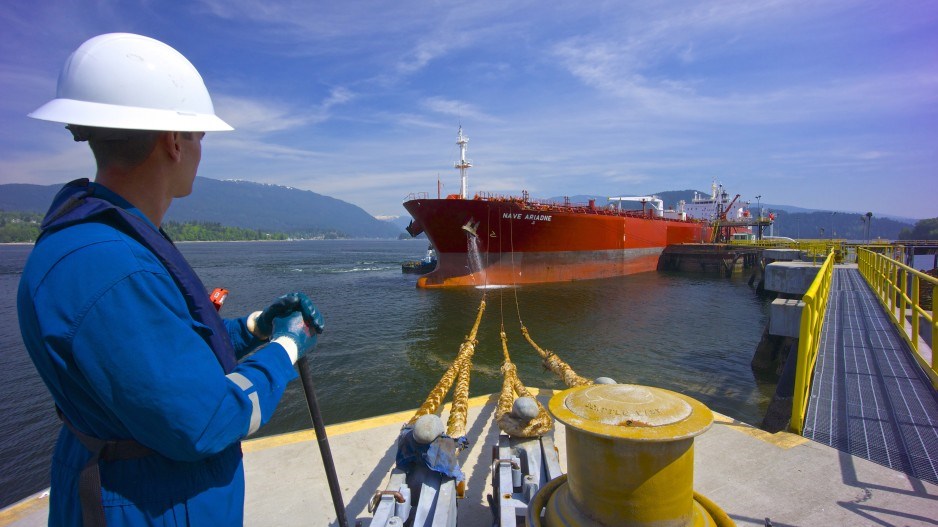Without oil tankers to take Alberta oil to foreign markets, an expanded Trans Mountain pipeline would be “the proverbial pipeline to nowhere,” and yet when it reviewed the $7.4 billion expansion project, the National Energy Board (NEB) failed to fully consider the environmental impacts of increased oil tanker traffic.
In doing so, it breached an obligation to consider incidental impacts, as required the Canadian Environmental Assessment Act (CEAA)
Moreover, after assuring Tsleil-Waututh First Nation Chief Maureen Thomas that the concerns her people raised in their own impact assessment would be discussed and considered, federal Natural Resources Minister Jim Carr approved the expansion just one day after making those assurances.
Those were some of the key points made Monday October 2 by lawyers representing the Tsleil-Waututh on the first day of a Federal Court of Appeal hearing in Vancouver.
“The CEAA statutory process was not followed, Canada’s duty to consult and accommodate Tsleil-Waututh was not discharged, and the board selectively picked and chose when to apply the constitution,” said Scott Smith, one of the lawyers representing the Tsleil-Waututh.
The court is hearing a consolidated appeal against the NEB and Attorney General of Canada over the federal government’s approval last year of the Trans Mountain pipeline expansion.
The expansion involves twinning of the existing pipeline running from Alberta to Burnaby, tripling its capacity, from 300,000 barrels per day (bpd) to 890,000 bpd, and increasing oil tanker traffic in Burrard Inlet from five per month to 34.
Appellants under the consolidated appeal include six First Nations, the cities of Burnaby and Vancouver, and two environmental groups – the Raincoast Conservation Foundation and Living Oceans Society.
The new NDP government is among the interveners in the case, and will argue against the expansion later this week.
Of the six First Nations making their case, the Tsleil-Waututh are the most directly affected, since their traditional territory is Burrard Inlet, where the pipeline terminates and where tank farm and oil tanker terminal, both of which are to be expanded, are located. Their main reserve is just across the inlet from the Westridge Marine Terminal.
In opening arguments Monday, Smith said the Government of Canada conducted only “low level” consultation, rather than the deeper consultation required, as per legal precedents.
He cited last year’s Gitxaala decision as an example. In that decision, the courts quashed the federal government’s approval of the Northern Gateway pipeline on the basis that consultation with First Nations had been inadequate.
In approving the pipeline expansion, the Tsleil-Waututh argue that the NEB and Governor in Council made three errors in law:
• the NEB erred by excluding marine shipping from a designated project;
• Canada breached its duty to consult and accommodate the Tsleil-Waututh; and
• Canada was required to consider whether the project would infringe Tsleil-Waututh title and rights, but failed to do so.
In 2012, the Stephen Harper government streamlined regulatory processes to allow the NEB to conduct both regulatory and environmental reviews. Previously, Environment Canada would have also done a review.
While the NEB was obliged to conduct a proper review under the CEAA, it failed to do so, the Tsleil-Waututh argue.
The NEB’s mandate focused strictly on the pipeline project, and did not give serious consideration to tanker traffic and its impacts on the marine environment – including southern resident killer whales – and aboriginal fishing rights, as would be expected under a full environmental assessment.
The NEB’s mandate may be narrow and limited strictly to the scope of a particular project – in this case a pipeline. But as the regulatory body responsible for also ensuring the requirements of the CEAA are met, it also could have – and should have – considered impacts to the marine environment, since the CEAA allows for “incidental” activities to be considered as part of an environmental review – and tanker traffic will be more than incidental to an expanded pipeline.
“The respondents argue it was reasonable to exclude marine shipping activities because those are not regulated by the board,” Smith said.
“Nothing in CEAA permits the board or the GIC (Governor in Council) to exclude physical activities that are incidental to a pipeline because they are not regulated by the board. If Parliament wanted to impose such a requirement, it would have done so expressly. It did not.
“Tsleil-Waututh submits that it was incorrect and indeed unreasonable for the board and the GIC to exclude marine shipping from the designated project.”
According to Smith, government officials who conducted consultations with the Tsleil-Waututh had no authority to negotiate or make concessions, but were mere note-takers tasked with listening. The Tsleil-Waututh do not consider that to be genuine consultation and accommodation.
After commissioning its own assessment that included anthropological and archaeological studies to bolster its case, the Tsleil-Waututh presented the government with its concerns. smith said Chief Maureen Thomas was given assurances by Carr on November 28, 2016 that their concerns would be considered. Carr approved the pipeline expansion the very next day, on November 29, 2016.
The appeal is scheduled to run over eight days. The federal government is expected to begin making its case next week, on October 10.




